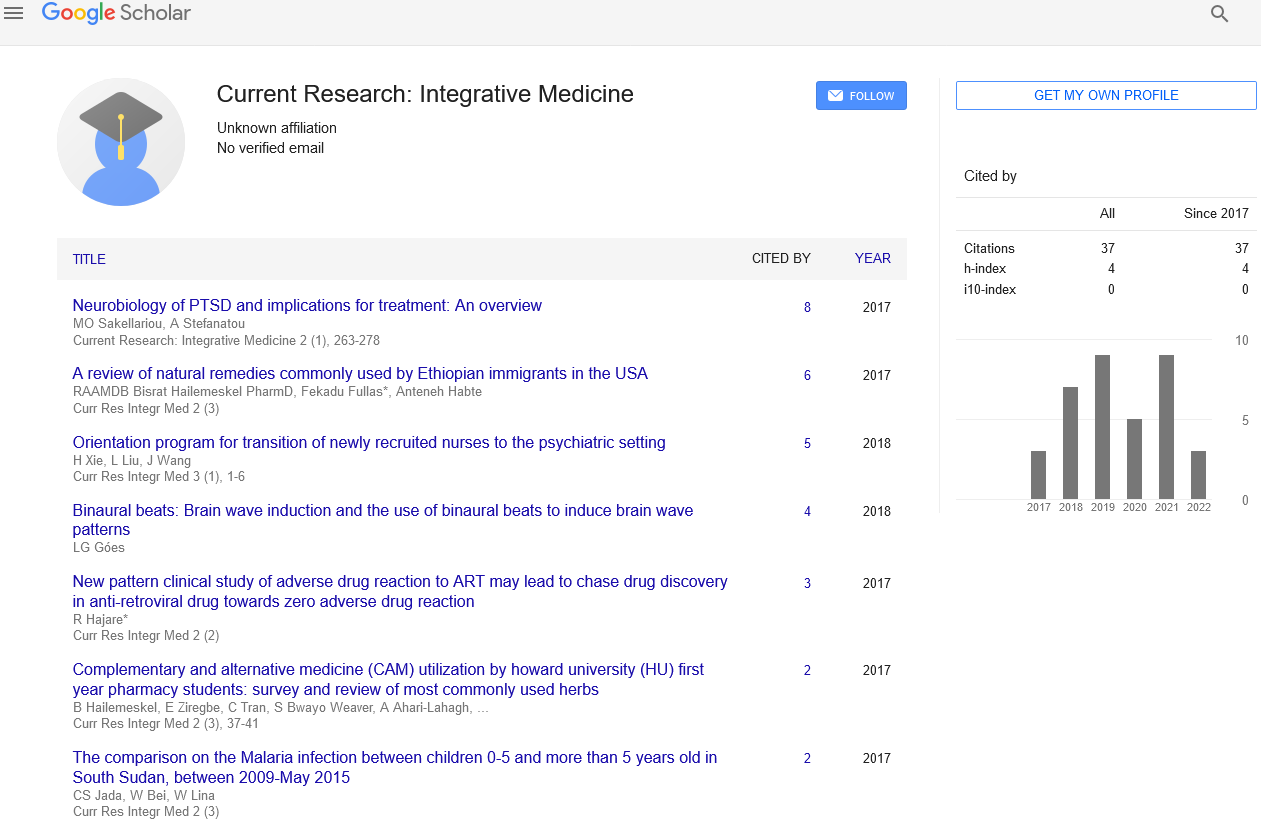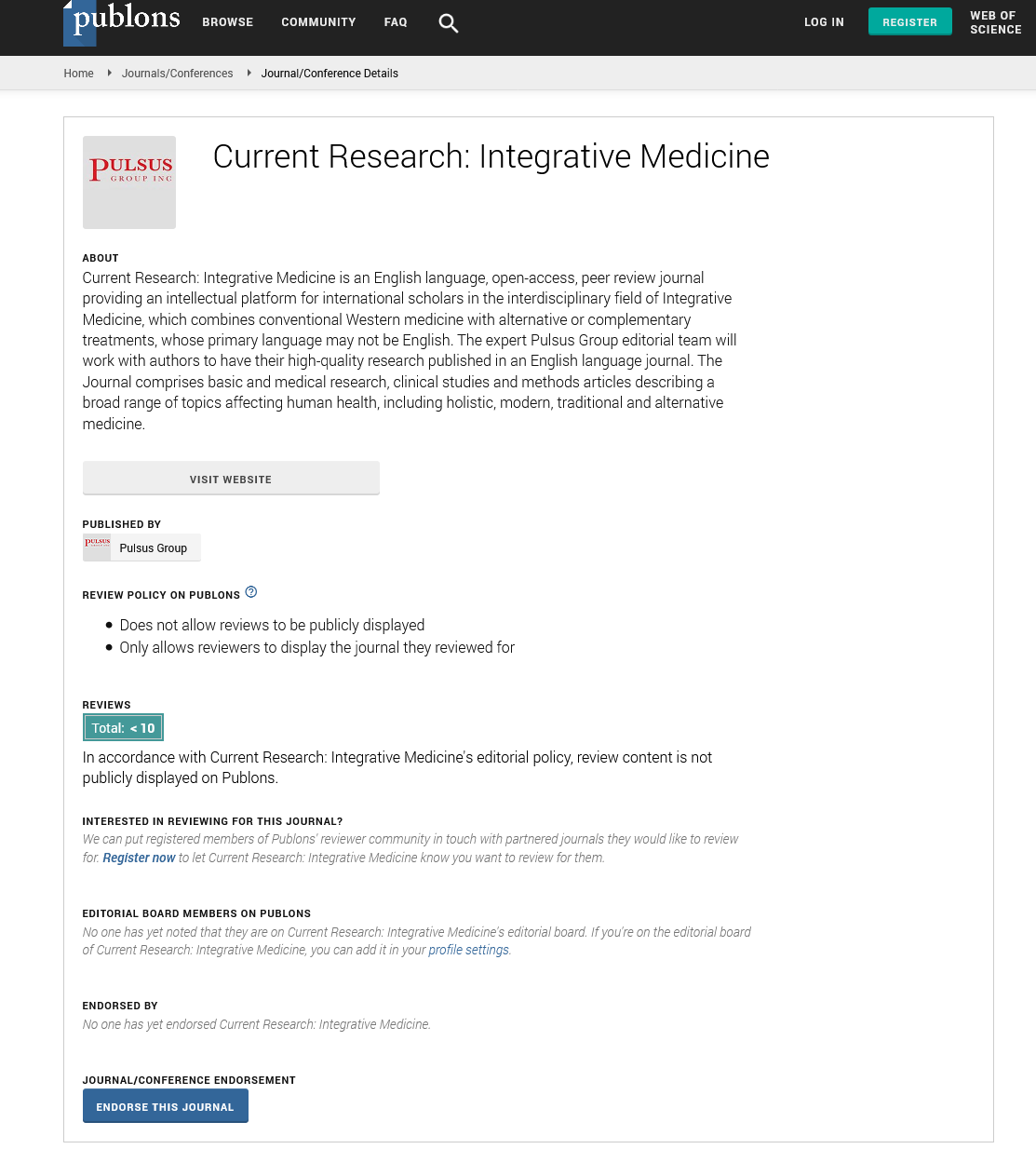Integrative oncology education: brief introduction
Received: 12-Sep-2023, Manuscript No. pulcrim-23-6738; Editor assigned: 16-Sep-2023, Pre QC No. pulcrim-23-6738 (PQ); Accepted Date: Sep 27, 2023; Reviewed: 20-Sep-2023 QC No. pulcrim-23-6738 (Q); Revised: 23-Sep-2023, Manuscript No. pulcrim-23-6738 (R); Published: 29-Aug-2023, DOI: 10.37532. pulcrim.23.8 (5) 67-69
Citation: Teresa. A Integrative oncology education: brief introduction Curr. Res.: Integr. Med. 2023;8(5):67-69
This open-access article is distributed under the terms of the Creative Commons Attribution Non-Commercial License (CC BY-NC) (http://creativecommons.org/licenses/by-nc/4.0/), which permits reuse, distribution and reproduction of the article, provided that the original work is properly cited and the reuse is restricted to noncommercial purposes. For commercial reuse, contact reprints@pulsus.com
Abstract
An increasing number of cancer patients incorporate complementary and alternative therapies into their cancer treatment journey, both during and after conventional treatments. Patients often hesitate to openly discuss these therapies with their oncologists, while oncologists themselves may possess limited knowledge and confidence in guiding patients regarding their appropriate use. Integrative oncology represents a patient-centered, evidence-based discipline that incorporates practices such as mind-body techniques, lifestyle adjustments, and natural products alongside conventional cancer treatments. Its core principles prioritize patient safety and rely on the best available evidence to offer suitable complementary interventions alongside standard care. However, there remain limited educational opportunities for oncologists to acquire knowledge in the field of integrative oncology. In this commentary, we spotlight the Integrative Oncology Scholars (IOS) program as a promising avenue for enhancing competency in this burgeoning area. We present an overview of various integrative oncology approaches covered by this program, encompassing lifestyle modifications, physical activity, and mind-body interventions.
Key Words
Integrative oncology; Oncology education; Integrative medicine; Supportive cancer care
Introduction
A substantial number of individuals dealing with cancer, including A both patients currently undergoing treatment and survivors, incorporate complementary and alternative therapies into their care regimen. A recent meta-analysis encompassing 32 surveys conducted among cancer patients in North America revealed a point prevalence of 46% (with a 95% confidence interval ranging from 35% to 56%) concerning the utilization of complementary medicine. This analysis also illustrated a consistent upward trend in the use of such therapies over the past few decades. Patients cite a diverse range of motives for seeking out complementary treatments, including their belief in the efficacy of these therapies, the desire to maintain a sense of control over their treatment, and the hope they provide.
Despite the increasing adoption of complementary therapies, there exists a significant gap in communication between both patients and healthcare providers in the field of oncology. A recent survey conducted by the American Society of Clinical Oncology (ASCO) revealed that less than half of the surveyed oncologists discussed the utilization of complementary and alternative therapies with their patients. Moreover, only a minority of these conversations were initiated by the oncologist themselves. Surveys have indicated that a common reason patients do not disclose their use of complementary and alternative medicine is because their physician never inquired about it. Many healthcare professionals are hesitant to broach the subject of these therapies with their patients due to their lack of knowledge regarding how to address this information effectively. Furthermore, they may be unaware of the potential risks and benefits associated with complementary and integrative treatments. In addition, healthcare providers may not be familiar with the role of complementary therapies in managing symptoms or the existing evidence supporting their effectiveness. Consequently, numerous patients report receiving insufficient guidance on selecting appropriate therapies and often rely on recommendations from friends and family rather than seeking advice from healthcare experts.
This situation represents a noteworthy concern in terms of healthcare quality, as the absence of education among conventional healthcare providers and the lack of effective communication between patients and their healthcare teams can result in potential harmful interactions and missed opportunities to suggest evidence-based integrative therapies that could potentially benefit patients throughout their cancer journey.
One way to tackle these multifaceted concerns is by embracing the relatively recent field of Integrative Oncology. Integrative Oncology represents a patient-centric, evidence-grounded strategy that seamlessly incorporates practices like mind-body techniques, lifestyle adjustments, and natural remedies alongside conventional cancer treatments. It places paramount importance on safety and relies on the best available evidence to provide suitable complementary interventions in conjunction with standard care. The Society for Integrative Oncology (SIO) has developed numerous evidence-based practice guidelines, with the most recent one receiving endorsement from the American Society of Clinical Oncology (ASCO). Furthermore, there is ongoing collaboration between SIO and ASCO to produce a series of five fresh evidence-based guidelines for integrative therapies in oncology care. As additional evidence emerges, including the release of these collaborative guidelines, it becomes increasingly imperative for oncology providers to possess the knowledge, competencies, and skills required to engage in conversations about diverse complementary and integrative therapies with their patients. Up until recently, however, there has been a notable absence of specialized training opportunities tailored to oncology providers seeking to expand their expertise in this area.
LIFESTYLE MODIFICATIONS
1. Diet
Numerous cancer patients express curiosity regarding the "optimal diet" for managing cancer and whether dietary modifications can influence their cancer prognosis. A range of 3% to 48% of cancer patients opt to pursue "special diets" while undergoing cancer treatment. Regrettably, several of these popular diets, such as the ketogenic diet, lack comprehensive scientific scrutiny and therefore lack substantial empirical support for their application. Furthermore, some of these diets may result in nutritional deficiencies.The American Institute for Cancer Research (AICR) and the American Cancer Society (ACS) have established evidence-based dietary guidelines for individuals affected by cancer. These guidelines advocate for the maintenance of a healthy body weight, consumption of a diet abundant in fruits, vegetables, whole grains, and legumes, and the restriction of red and processed meat, alcohol, and sugar intake.
2. Physical
Activity Engaging in a sedentary lifestyle has been correlated with the onset of various cancers and is linked to heightened cancer mortality, increased chances of cancer recurrence, and the emergence of side effects related to cancer treatment. Unfortunately, a minority of cancer patients partake in physical activity during or following their treatment. The American Cancer Society (ACS), the American Institute for Cancer Research (AICR), and Cancer Care Ontario (CCO) advocate for 150 minutes of moderately intense aerobic physical activity per week for adults. Furthermore, the ACS advises against prolonged periods of sedentary behavior (i.e., extended sitting), while CCO additionally recommends incorporating resistance training into one's aerobic exercise routine after a cancer diagnosis. Engaging in physical activity throughout cancer treatment has demonstrated numerous advantages, including enhanced quality of life and overall well-being, alleviation of cancer-related fatigue, mitigation of symptoms associated with depression and anxiety, as well as managing conditions like lymphedema and chemotherapy-induced peripheral neuropathy.
MIND—BODY THERAPIES
Mind-body therapies encompass a set of practices that amplify the interplay between the mind and bodily functions, with the aim of promoting relaxation and enhancing one's general health and sense of well-being .These approaches vividly illustrate the interconnection between physical health, psychological states, and spiritual wellness. Among the most prevalent and extensively studied mind-body therapies are meditation, yoga, tai chi, guided imagery, and hypnosis.
1. Meditation
Numerous meditation approaches have undergone examination in cancer patients, with the most extensively studied and scientifically supported ones arising from Mindfulness-based Stress Reduction (MBSR) or Mindfulness-based Cognitive Therapy (MBCT). Collectively, these interventions are known as mindfulness-based interventions (MBIs). Within the framework of these therapeutic methods, mindfulness entails acquiring the skill of attentively observing the workings of one's mind in the present moment. This practice serves as a means to mitigate the exacerbation of emotional and physical distress, as well as pain. A recent systematic review and meta-analysis assessing the impact of MBIs on the psychosocial and physical well-being of cancer patients and survivors revealed notable enhancements in areas such as psychological distress, anxiety, depression, fear of cancer recurrence, fatigue, sleep quality, and Yoga pain
2. Yoga
Yoga represents a mind-body practice that integrates physical postures (known as asanas) with controlled breathing and meditation techniques. Various yoga styles exist, including hatha, Iyengar, restorative, and more vigorous forms of practice. The choice of yoga style should be individualized for cancer patients or survivors, taking into account their physical capabilities and any specific spiritual aspects they may seek. A recent review encompassing Randomized Controlled Trials (RCTs) examining the effects of yoga on individuals with cancer consistently demonstrated improvements across multiple aspects of quality of life, fatigue, sleep quality, and psychological well-being.
3.Acupuncture and Acupressure
Acupuncture is a non-pharmacological approach rooted in traditional Chinese medicine. It entails the insertion of fine needles through the skin at specific points known as acupoints, with the aim of stimulating the flow of energy within the body. Acupressure, on the other hand, involves the use of thumbs or fingers to apply pressure to these acupoints, omitting the use of needles. Both acupuncture and acupressure have undergone investigation for their effectiveness in managing various cancer-related side effects.
NATURAL HEALTH PRODUCTS
Natural Health Products (NHPs) are dietary supplements that augment one's diet and typically contain one or more of the following components: vitamins, minerals, herbs or botanicals, and amino acids .In Canada, the regulation of natural health products falls under the jurisdiction of Health Canada, governed by the Natural Health Products Regulations. These regulations necessitate the acquisition of a product license and compliance with specific labeling requirements. Concerns related to the utilization of natural or dietary supplements in conjunction with conventional cancer treatment encompass potential interactions between these treatments, referred to as herbdrug interactions, as well as the combination of various supplements with each other, known as herb-herb interactions. Additionally, among patients undergoing surgical procedures, the use of NHPs may have an impact on factors such as bleeding time, anesthetic effects, or cardiovascular responses. Several supplements have been found to pose risks to patients with cancer, including alpha-tocopherol and beta-carotene, which have been associated with adverse effects in head and neck cancer patients undergoing radiation therapy.
Conclusion
Integrative oncology is a rapidly expanding discipline that employs the most reliable available evidence to incorporate safe and effective complementary therapies alongside conventional cancer treatments, all within a patient-centered framework. As an increasing number of cancer patients turn to complementary and integrative therapies, and as more research in this field becomes available, it becomes essential for oncologists to routinely inquire about their patients' utilization of these therapies.
Furthermore, it is crucial to integrate team members who have received training in Integrative Oncology, equipped with the necessary communication skills and competencies to assist patients in their decision-making processes. Furthermore, it is imperative to distinguish evidence-based integrative oncology therapies from those lacking sufficient evidence to substantiate their efficacy in enhancing various aspects of cancer care. Evidence-based integrative therapies hold the potential to enhance the quality of life for cancer patients, and numerous studies have underscored the cost-effectiveness of embracing an integrative approach to cancer care.






